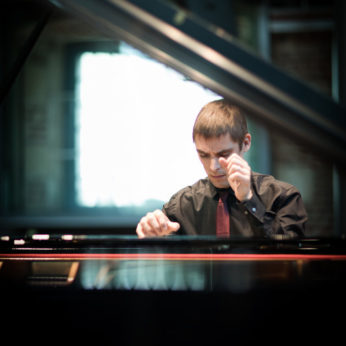Composer: Ludwig van Beethoven (b. 1770 - d. 1827)
Performance date: 25/06/2023
Venue: Bantry House
Composition Year: 1791
Duration: 00:23:59
Recording Engineer: Tom Norton, RTÉ
Instrumentation: pf
Instrumentation Category:Solo
Artists:
Cédric Tiberghien -
[piano]

24 Variations on ‘Venni Amore’ WoO 65 [1791]
Beethoven’s teenage years in Bonn were extremely busy. As well as taking lessons in keyboard and composition, he gave music lessons himself and was appointed Court Organist. Beethoven’s mother had died in 1787 and his violent and alcoholic father declined until his death in 1792. During this period, Beethoven was in charge of his family of two surviving younger brothers. Given the circumstances, Beethoven composed a surprising amount in Bonn; concertos, chamber music, sonatas, a major cantata and several sets of variations for the piano.
These variations are among a group he completed in 1791. They are considered among his best work from the Bonn years and were published in Mannheim in that year. The theme by Vincenzo Reghini Venni amore is a simple, if charming, affair made up of chords on each beat of the bar. Beethoven calls it an arietta. It is in D major and the tempo is an agreeable allegretto.
The first eleven variations follow the theme’s structure, tempo and key. However this does not prevent Beethoven from achieving some remarkable transformations. Immediately in the first variation, Beethoven, by introducing quavers between the theme’s chords, broadens and opens up the melody. By the third variation, the two hands alternate between the theme and a running semi-quaver accompaniment. There is wit, lyricism and unaffected high-spirits to this music. Beethoven seems to be enjoying himself.
Whether Beethoven realised it or not, these variations aren’t simply a sequence of ingenuous variations, they form a musical and emotional journey which will culminate in Variation Twenty Three The slower and quieter variations become more serious. In the eighth variation, built on semiquavers in the right hand and the theme in the left, begins to sound almost melancholy. It is immediately followed in the ninth variation by cascading chromatic thirds and fortissimo chords. The humour has returned. There is a swagger to the eleventh variation but now for the next two variations Beethoven changes from the major to the minor. The twelfth variation has more colour and more emotion. The staccato octaves of the following variation provides a stark contrast.
In the fourteenth variation Beethoven, changes the tempi by alternating the allegretto with four passages marked adagio. There are no repeats just four passages in both tempi. We are now in a quite different world. The seriousness continues to deepen. Again there is a contrast with the wonderfully witty twentieth variation. Left hand chords alternate with triplet semi quavers high in the treble and then of course the idea is repeated; but the other way round.
The twenty third variation is marked adagio sostenuto. It is much longer than the previous variations. This is the emotional heart of the work and is almost a slow movement in its own right. It anticipates some of the darker slow movements of the early piano trios and piano sonatas. The miraculous music fades away pianissimo and a broken chord introduces a bright Allegro. The theme is now stated entirely in quavers and Beethoven seems to embark on a high-spirited finale. Except again the music slows down to indulge in an exquisite reverie followed by the real finale which brings these fantastic variations to a high spirited, witty and very quiet conclusion.
David Winter
Copyright © 2025 West Cork Music. All rights reserved.
Designed and developed by Matrix Internet